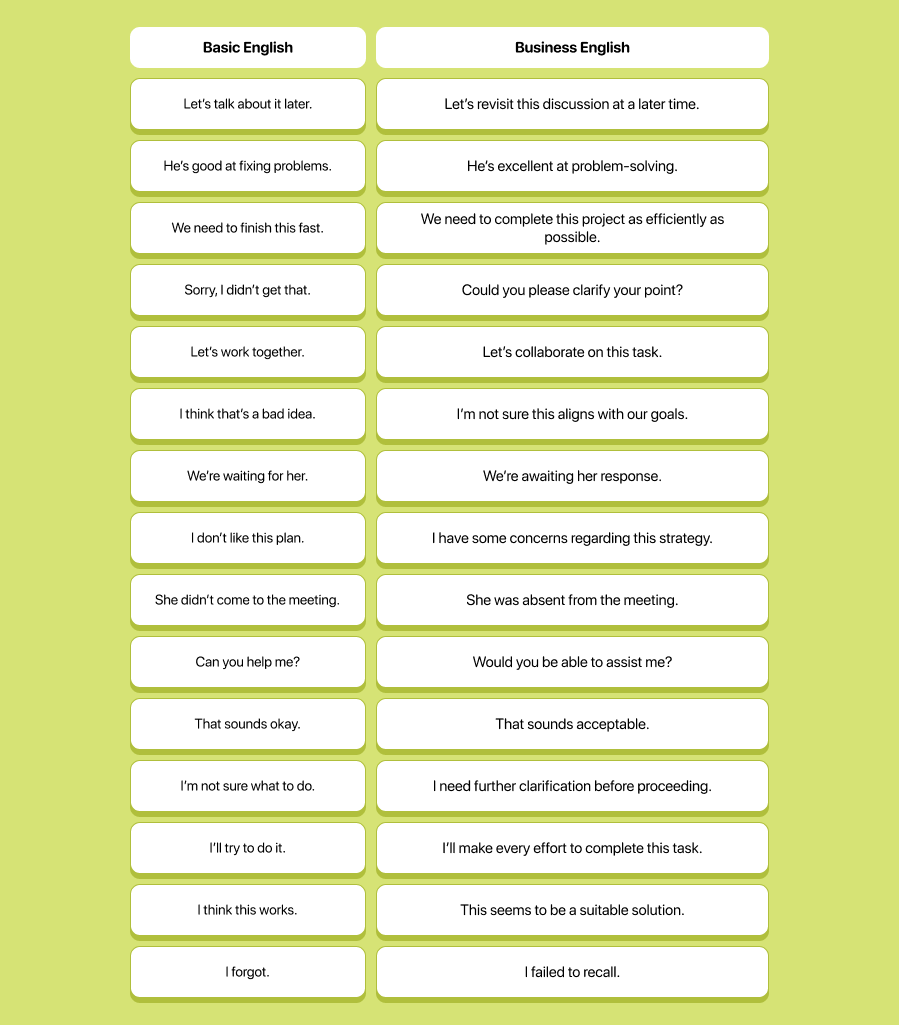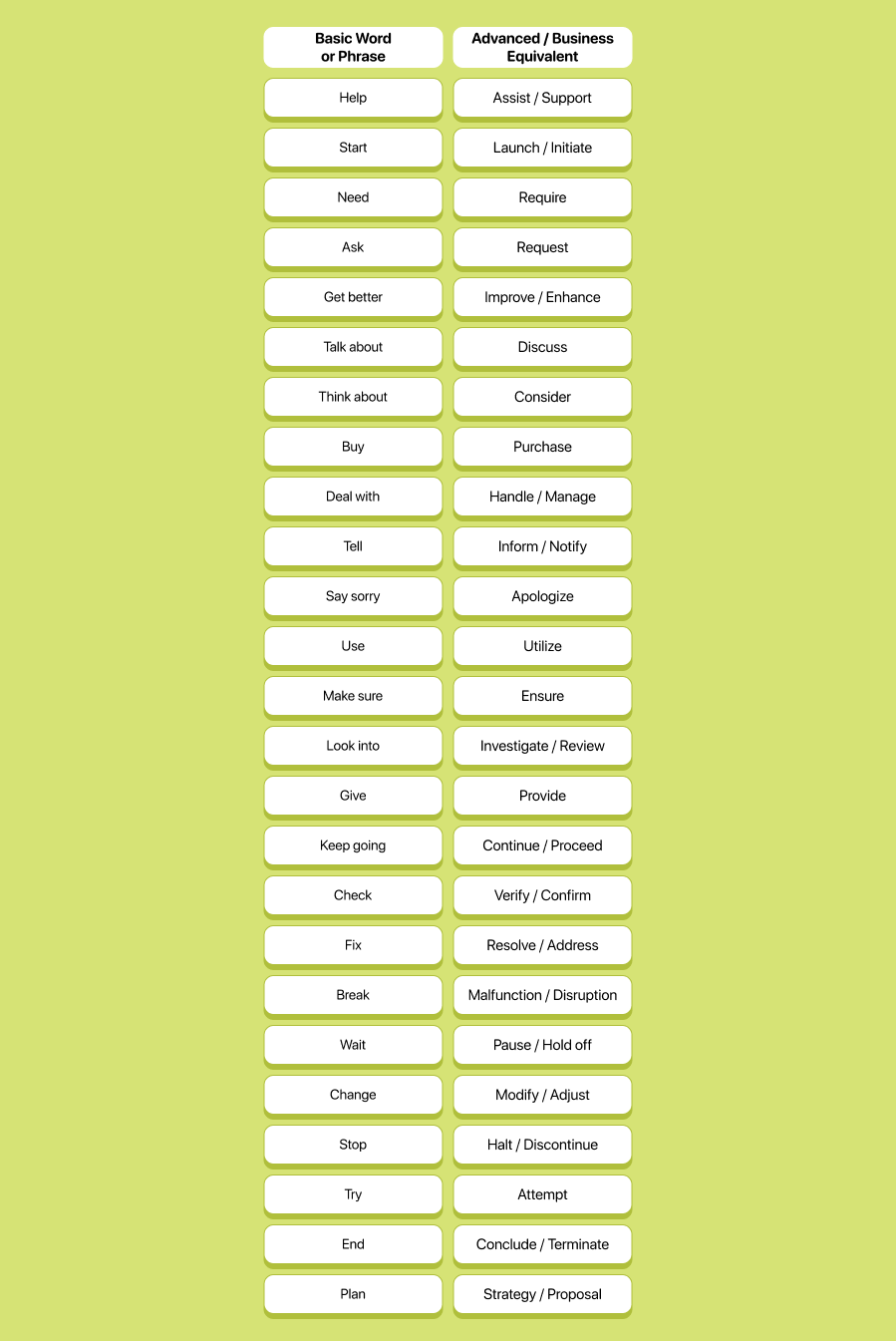You’ve been learning English for a while. You can order food, ask for directions, and have a casual chat. But then… You're in a business meeting and someone says, “We need to streamline our operations to increase efficiency”.
Wait... what? Welcome to the world of business English: a step (or three) beyond the basics. In this article, we’ll walk you through the difference between basic English vs business English, compare normal English vs advanced English, and show you how to level up, especially in professional contexts.
Why Does This Difference Matter?
If you're planning to work, study, or network in English, knowing the difference between basic and advanced English (especially in the workplace) can help you express yourself clearly and sound more professional.
Here’s why it matters:
- You avoid misunderstandings in business conversations.
- You make a better impression in interviews or emails.
- You understand documents like contracts, proposals, and reports.
Everyday vs. Office Talk: Side-by-Side Examples
Let’s break it down with examples. These show how phrases change from casual/basic to formal/business style:

These examples show that the difference between basic and business English often comes down to tone, precision, and word choice. Business English sounds more structured, but not stiff; it’s just clearer and more goal-focused.
Vocabulary Shift: From Basic to Advanced English
Here are some practical words you’ll often hear in professional conversations, emails, reports, and meetings:

Learning these terms is a fast way to upgrade your speaking and writing from basic to advanced English, especially when you want to impress in a business setting.
🎥 Real-Life English: Watch the Difference in Action
Still not sure how basic and business English sound in real situations? This short video shows it perfectly.
👉 See how the same idea transforms from casual to professional English.
Grammar Tweaks That Add Professional Polish
It’s not just vocabulary. Grammar structures in business or formal English tend to be more polished and indirect.
Instead of:
I’m gonna send the file.
Try:
I will send the file shortly.
Instead of:
We’re working on it.
Try:
The team is currently addressing the issue.
These small upgrades make you sound more professional and fluent without losing clarity.
Emails and Messages: Business Style in Action
Here’s how a typical message changes when shifting from basic to business English:
Basic:
Hi! I need the file. Can you send it now? Thanks.
Business English:
Dear John,
I hope this message finds you well. Could you please send over the updated file at your earliest convenience?
Best regards,
Maria
Notice how the message becomes more polite, structured, and formal, perfect for work settings.
Quick Tips to Move From Basic to Business English
Want to make the leap from casual to professional quickly? Try these:
- Read business news (BBC Business, Harvard Business Review)
- Watch professional videos (TED Talks, LinkedIn Learning)
- Practice shadowing – repeat business phrases you hear in podcasts, videos, or from your colleagues
- Rewrite your everyday sentences using formal words
- Keep a word journal with business equivalents
- Use templates for writing emails and reports
Every time you speak or write, ask yourself: Can I say this in a more professional way?
The shift from basic English to advanced English words is all about purpose. When you're chatting with friends, basic is great. But when you're presenting ideas, sending reports, or working in a team, upgrading to business English shows you’re serious, capable, and confident.
FAQ
1. What is the main difference between basic and business English?
Basic English uses simple, everyday words and phrases that are common in casual conversations, like chatting with friends or asking for directions. Business English, on the other hand, is more formal, specific, and structured. It’s used in professional settings like meetings, emails, reports, presentations, and negotiations, where clarity, politeness, and precision are essential.
2. Do I need to know business English for job interviews?
Yes, especially if you're applying for a position in an office, international company, or any job that requires written or spoken communication in English. Business English helps you express your ideas professionally, answer interview questions with confidence, and show that you understand workplace language. It can make a strong first impression and give you an edge over other candidates.
3. How can I improve my business English quickly?
Start by reading business-related content (like articles from Forbes or Harvard Business Review) and watching videos such as TED Talks or LinkedIn Learning courses. Pay attention to the language used in professional emails and meetings. Practice replacing basic words like "help" or "start" with business alternatives like "assist" or "initiate." Writing emails, summarizing news, or role-playing business situations will also help you build confidence and fluency faster.


















